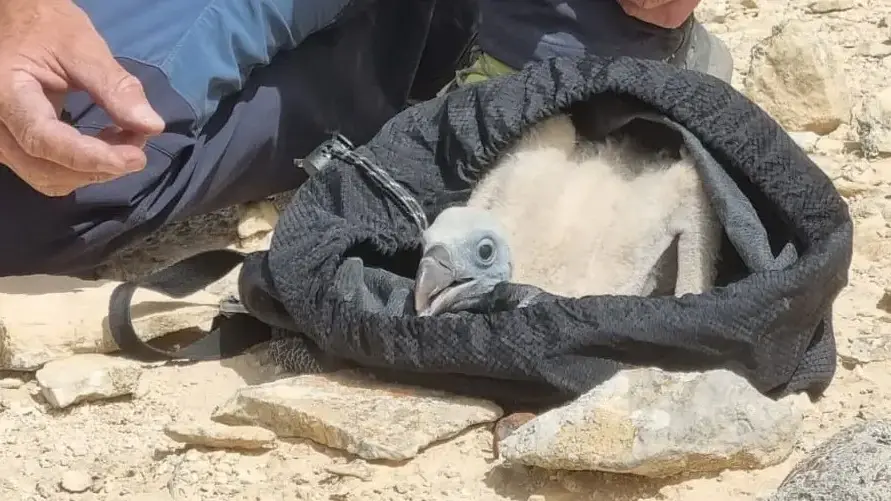Icon: enlarge
Photo: Bernd Wüstneck / picture alliance / dpa
Years of discussion have taken place, court rulings have been made - now the killing of male chicks is to be prohibited by law.
Federal Agriculture Minister Julia Klöckner (CDU) presented a corresponding draft law on Wednesday.
He envisages a ban from the end of next year.
Klöckner spoke of a "milestone for animal welfare".
Why did it need a law? What is the draft? And what are the solutions? An overview.
The problem
For the production of eggs, chickens are bred that are trimmed for a high laying performance.
The male chicks of these lines, the brothers of the laying hens, are useless for the hatcheries.
They cannot lay eggs, nor do they set meat well.
The strictly business perspective: raising them is not worthwhile.
So around 44 million male chicks are killed every year in Germany (asphyxiated with carbon dioxide or shredded) before they cause further costs.
The Animal Welfare Act, however, forbids inflicting pain or suffering on an animal "for no good reason".
The then red-green governed North Rhine-Westphalia wanted to ban the killing of chicks by decree in 2013.
Two hatcheries complained against it - and were initially right: The profitability of the operations was a "reasonable" reason for the killing, according to the judges of the Higher Administrative Court (OVG) in Münster.
Legal change of heart
The Federal Administrative Court had to check the OVG judgment last year for its correctness and the federal judges put a stop to its business-oriented interpretation of animal welfare: In the light of the state objective of animal welfare, which was incorporated into the Basic Law in 2002, the killing of chicks is not based "according to today's values more on a reasonable ground, "the decision said.
"The concerns of animal welfare outweigh the economic interests of the hatcheries."
It couldn't be more clear.
The animal rights activists of the Peta organization spoke of a "historic decision".
However, the judges allowed the killing for a transitional period.
The hatcheries should not be overwhelmed, after all, this practice was "accepted for decades".
That is why the roughly two dozen German hatcheries cannot be required to switch over immediately.
A transition period is necessary until methods for determining sex in the egg are ready for the market.
The solution?
The federal government has supported research into early gender determination with expenditure of millions.
After years of tinkering at universities, the industry has now further developed two processes.
Because the poultry breeding dynasty of Erich Wesjohann is behind one process and Rewe behind the other, it is also a duel between two billion-dollar companies.
more on the subject
Poultry farming: Klöckner wants to ban the killing of chicks
Poultry industry: That is why the judgment on the killing of chicks strengthens animal welfare by Nils Klawitter
Wesjohann versus Rewe: Race in Chick Rescue by Nils Klawitter
New technology is coming: poultry lobby promises end of chick shredding
Wesjohann
favors the
spectroscopic method
.
After the fourth day of incubation, a laser cuts a small hole in the shell and a beam of light is directed onto a blood vein on the yolk.
With the help of the scattered light and with the help of a spectroscope and algorithm, the sex is determined: Eggs with female embryos are glued together and further hatched, the male eggs go to the animal feed or cosmetics industry.
However, the process is not yet ready for the market.
With the previous prototypes, the error rate is still too high.
The procedure used by the
Rewe subsidiary Seleggt is
called
endocrinological
.
A drop of embryonic urine is taken from the hatching egg on about the ninth day using a needle and the sex is determined with a kind of pregnancy test.
Seleggt also had start-up problems, but meanwhile around 60,000 eggs per week can be determined.
Seleggt offers hatcheries the process as a service and then delivers the female eggs back to the hatcheries.
The eggs that these female chicks later lay are already on the market as "Respeggt" eggs at Rewe and Penny.
Seleggt receives a license fee of around two cents per egg from the grocery store.
More pitfalls
Klöckner not only wants to ban the killing of chicks, but from 2024 only allows methods that take effect before the seventh day of incubation.
Because from the seventh day the embryos would feel pain, according to the draft law.
The only so far marketable method from Seleggt does not measure until the ninth day and, from today's perspective, it will hardly be able to do this earlier.
From business circles it is heard that planned double-digit million investments in the process may now be stopped.
Even if the German methods were established, consumers could still switch to eggs from hens that come from hatcheries abroad, where chick killing is still allowed.
Klöckner therefore appealed to consumers to refrain from buying eggs from abroad once the law came into force.
The alternatives
There are two ways out that animal rights activists have long been calling for.
One thing would be not to process the so-called brother cocks into animal feed, but to let them live and fatten them.
So far, however, industrial logic has forbidden this: the fattening process takes too long and the taps do not put on enough muscle meat.
Research has also been carried out on the dual-purpose chicken for some time.
The hens of such lines should have a decent laying performance, the cocks are good for fattening, as it has been for thousands of years.
However, it is still not working out properly - also because the few large breeding companies have no interest in it and have relied on one-dimensional high-performance breeding.
These companies also supply their chicks to many organic farms.
In order to end this, the organic sector is now trying to find alternatives and its own breeding lines, such as the Ökologische Tierzucht GmbH, supported by the associations Bioland and Demeter.
Icon: The mirror














